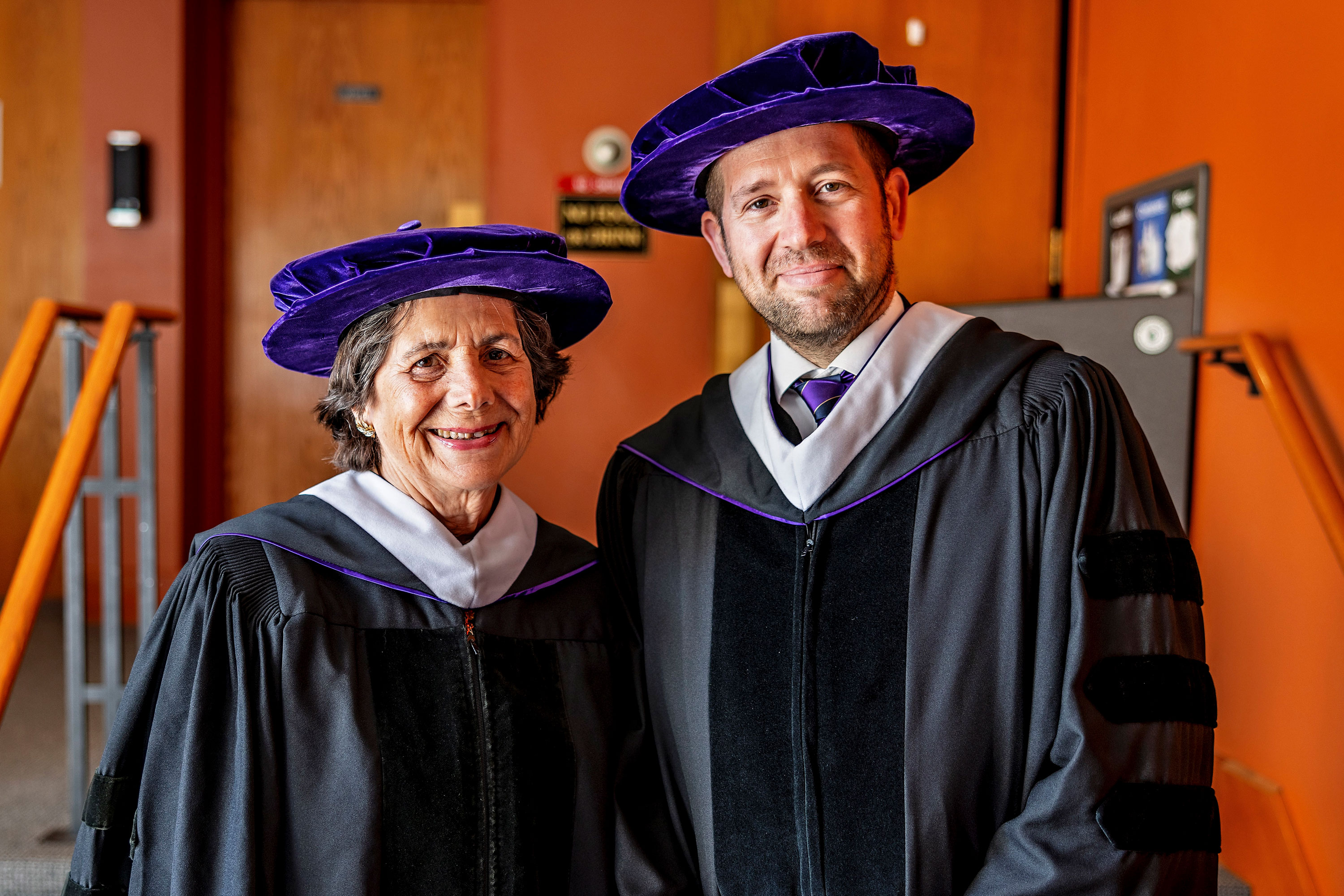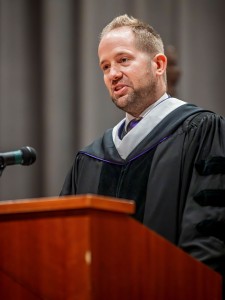The following is the prepared text of the Founders' Day address delivered by Alexander Tyrell-Kenyon, Eighth Lord Kenyon, on Oct. 24, 2024. Watch a recording of the ceremony or view more photos from the celebration.
The history of the founding of Kenyon College is something I am sure most of you are more well versed in than I. The second Lord Kenyon was my great-great-great-great grandfather. He, together with Lord Gambier, provided the funds with which Bishop Chase was able to found this magnificent establishment — a couple of sentences that do not do justice to the enormity of the task Bishop Chase was faced with.
I feel incredibly honoured to be here today, celebrating 200 years of Kenyon College, an achievement which I have had entirely no input into. Like my father 25 years ago, I have been overwhelmed by the enthusiastic welcome my mother and I have received, and I feel a significant amount of impostor syndrome receiving such hospitality.

For those of you who aren’t aware of my family’s recent history: My father, who was greatly looking forward to this celebration, sadly passed away five years ago, and even more sadly, my elder brother Nic died at the end of last year. Leaving me to take on the mantle of Lord Kenyon and setting me on the path that leads me to be standing in front of you today.
Like Prince Harry, I am the “Spare,” and equally like him, I am possibly a little more irreverent and a little less serious than my new position would dictate. Thankfully, that’s as far as the comparison goes. I’m not writing a book, and I manage to keep out of the tabloids!
Traditionally, in aristocratic families, a second son would either join the army or the clergy. I didn’t fancy either, and while I decided what to do with my life, I went travelling around Southeast Asia for a year. That turned into 10 years, when I discovered scuba diving and became a dive instructor. On my return to the UK, I made the third choice of teaching, and have been educating students in maths ever since, and being a teacher is why I feel I have something worthwhile to say here today.
The second Lord Kenyon also founded a primary school in the UK in 1811. The Madras Primary School was named for the system of education he witnessed in Madras, India, where the older children were encouraged to assist the younger ones as much as possible, an early example of peer learning, which is still an incredibly useful teaching technique that I am always happy to utilise. The Madras school is still going strong, and I am proud to continue the tradition that there has been a Kenyon on the board of governors for 213 years.
As a governor, I am aware of the intricacies and difficulties of running and maintaining a small primary school, and while the difference in scale between the Madras and Kenyon College is vast, I assume that many of the problems I face are similar to those faced by the governors and staff team here today.
So I would like to thank the governors for playing their part in the first 200 years and charge them with securing the college’s future for the next 200 years. However, they can’t do it alone, but with the help of the entire Kenyon community, Donors, alumni and, of course, President Kornfeld and her fantastic team, I’m sure the future of this unique establishment will endure.
My experience of teaching through Covid was that online teaching is a disaster. It might work passably for higher education, where the learners are invested in the subject and determined to learn, but I can’t foresee a future where the majority of learning can be online, it just doesn’t give the power and importance of face-to-face learning, and engagement, the justice and opportunities which a range of students and their methods of learning deserve.
Moving forward, the College will face many more challenges, amongst them will be the use of technology and the increasing use of AI. I’m so glad that I teach maths and, as such, am not impacted by the rise of Chat GPT and other AI platforms that can now produce in seconds a far better essay than I can do in several days. To the students here, I'm going to say what I tell my learners when they discover there's an app for your phone that can do algebra: Don’t just use it for the answer, but it can be used to help you to your own solution. To the professors, lecturers and tutors, I don’t envy your position … good luck!
I’m certain that my great-great-great-great grandfather would be blown away (maybe not the words he would have used) by the success of his investment, and the more I learn about Kenyon, the more I am, too. I have thoroughly enjoyed learning of the successes of the College in my preparation for travelling over here, and even more so now that I am here. I am so proud that my family name is spoken with respect and reverence with regard to this College, and I hope that each and every one of you here today feels the same pride for being part of this great establishment and community.
When I was asked to give this address, the first thing that sprang to mind, after of course why would they want to hear from me, was Baz Luhrmann’s song “Everybody's Free (To Wear Sunscreen).” His advice to the Class of ‘97 (that dates it!) is still as valid today as it was then. If you’ve not heard it, I urge you to find it and listen carefully, even if, as it predicts, you’ll ignore much of the advice until you are older! I’d like to extrapolate on two of his shorter points, and add one from my own perspective.
- FLOSS. The British are notorious for having terrible teeth, and until recently I’ve neglected mine. Flossing just seemed such a faff. We all know it’s important, and I hope that most of you here look after your health. For those that don’t, buy a water flosser, it will change your life. To quote my wife when she used hers for the first time: “It dislodged food that had probably been there long enough to earn a birthday celebration.”
- TRAVEL. In contrast to Europe, America doesn’t have a work culture that encourages travel (although I believe this is changing slowly). Firstly, I’d like to congratulate you for finding your way to Gambier, but now I encourage you to go beyond. I’m delighted to see the College has 200 overseas placements — fight for them, and any other opportunity that can take you to experience other countries, languages and cultures. I know it’s scary. Twenty years ago I got on a plane to Malaysia with no idea where I was going to stay that night, and my backpack didn’t get off the same plane that I did — I survived, and you will too.
- Take care of what you EAT. As well as teaching maths, I also run a small organic farm. Buy local, regenerative or organic. I know this is more expensive, but you and your health are worth the investment, so maybe just what you can afford. But if you need an incentive, a nonorganic apple can be sprayed 10 or more times with insecticides and fungicides and then put through a bleach solution after harvesting — this is supposed to remove the chemicals, but fails to do so. The FDA recommends washing fruit and veg with running water; this also fails to remove these chemicals. However, if you have the time to soak your apple in a baking soda solution for 15 minutes, it will remove most of the chemicals from the surface of the apple, but sadly, can’t touch the chemicals that have already leached through the skin. I think we’d all prefer an organic apple.
I apologise for slipping into lecture mode, and thank you for listening. It’s a great honour for me to be here, and before I go, I’d like to issue a challenge to any Kenyon student, past, present or future. When I was at school, there was another boy, Richard Vassar-Smith, whose great-great-great-great grandfather had also founded a college in America. And just because it rhymes with NASA, his college got a name check in the James Bond film “Moonraker.” My challenge to you all, is to get Kenyon College named in a major Hollywood film. There’s a bottle of British whisky in it for whomever succeeds.
Thank you.
